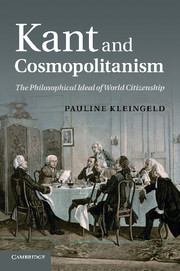Book contents
- Frontmatter
- Contents
- Acknowledgments
- Abbreviations and main primary texts
- Introduction
- Chapter 1 Kant and Wieland on moral cosmopolitanism and patriotism
- Chapter 2 Kant and Cloots on global peace
- Chapter 3 Kant’s concept of cosmopolitan right
- Chapter 4 Kant and Forster on race, culture, and cosmopolitanism
- Chapter 5 Kant and Hegewisch on the freedom of international trade
- Chapter 6 Kant and Novalis on the development of a cosmopolitan community
- Chapter 7 Kant’s cosmopolitanism and current philosophical debates
- Bibliography
- Index
- References
Chapter 1 - Kant and Wieland on moral cosmopolitanism and patriotism
Published online by Cambridge University Press: 05 November 2011
- Frontmatter
- Contents
- Acknowledgments
- Abbreviations and main primary texts
- Introduction
- Chapter 1 Kant and Wieland on moral cosmopolitanism and patriotism
- Chapter 2 Kant and Cloots on global peace
- Chapter 3 Kant’s concept of cosmopolitan right
- Chapter 4 Kant and Forster on race, culture, and cosmopolitanism
- Chapter 5 Kant and Hegewisch on the freedom of international trade
- Chapter 6 Kant and Novalis on the development of a cosmopolitan community
- Chapter 7 Kant’s cosmopolitanism and current philosophical debates
- Bibliography
- Index
- References
Summary
Introduction
In 1772 a group of Göttingen University students with literary aspirations and a shared admiration for the ancient Germanic tribes came together – first under an oak tree, then in a room richly decorated with oak branches. They toasted the death of Christoph Martin Wieland (1733–1813), who was one of the most influential German authors at that time. They tore his books to pieces, danced on the pages, and then burned the shreds together with a portrait of the much-hated Wieland.
What had Wieland done? The group accused him of admiring ancient Greek and Roman literature. They saw him as the symbol of the degeneration of the German soul: he was too rationalist, too focused on literary style, and too frivolous – he even wrote texts that were intended to be comical. He was not deep, not serious enough. The group insisted that German authors should let themselves be inspired by the Germanic past and treat more worthy subjects such as fatherland, feeling, virtue, and great heroic deeds, which could then form the basis for genuine Germanic bard songs.
- Type
- Chapter
- Information
- Kant and CosmopolitanismThe Philosophical Ideal of World Citizenship, pp. 13 - 39Publisher: Cambridge University PressPrint publication year: 2011

